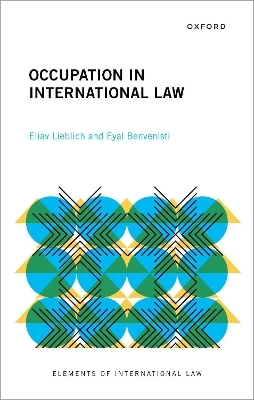
Occupation in International Law
Oxford University Press (Verlag)
978-0-19-886103-4 (ISBN)
The international law of occupation is the body of law, under international humanitarian law, that regulates the actions of states that gain effective control over territory during armed conflict. This body of law seeks to balance between several interests, which are often in tension with one another. Its most fundamental principle is that occupation does not confer sovereignty, and that the powers of the occupant are limited to that of a temporary trustee. What empowers the occupant to maintain public order and safety, including that of its own forces? How are the rights of the absent sovereign protected, as well as the right to self-determination, and the individual rights of the local population?
In this new volume of the Elements of International Law series, Eyal Benvenisti and Eliav Lieblich seek to provide an entry point to the topic by elaborating on general principles and key rules. The book explores the tensions and dilemmas which characterize the modern law of occupation, while highlighting, when needed, interpretations which best conform with the law's object and purpose. All in all, this book aims to guide relevant actors - whether states, academics, NGOs, or individuals under occupation - when seeking to assess or to challenge state actions in occupied territories.
Eyal Benvenisti is a member of the Institut de Droit International and of the Israeli Academy of Sciences and Humanities. He was previously on the Editorial Board of the American Journal of International Law (2009-18) and was Project Director of an ERC Advanced Grant (2013-18). Professor Benvenisti is currently a member of the Global Faculty of the NYU School of Law, and has been a Visiting Professor at the Hebrew University of Jerusalem, at Yale, Harvard, Toronto, Columbia, Pennsylvania, and Michigan. He gave special courses at The Hague (2013) and Xiamen Academies of International Law (2017), and will deliver the General Course at The Hague Academy in 2024. He is a co-editor of the British Yearbook of International Law. Eliav Lieblich joined Tel-Aviv University's Faculty of Law in 2016. He earned his J.S.D. and LL.M. degrees from Columbia Law School, and an LL.B. from Hebrew University. Professor Lieblich teaches and researches public international law, with a focus on the laws of war the use of force, just war theory, international humanitarian law, and the history and theory of international law. He has taught at Northwestern University and at the European University Institute's Academy of European Law. Professor Lieblich is also general editor of the Yearbook of International Humanitarian Law.
Table of Authorities
Introduction
1: Occupation: History, Normative Framework, Concepts
2: Definition, Beginning, and End of Occupation
3: Maintaining Public Order and Life in Occupied Territories: General Issues and Specific Obligations
4: Maintaining Public Order in Occupied Territories: Prolonged and Transformative Occupation
5: Security Measures and Military Necessity: Powers and Limitations
6: Private and Public Property and Natural Resources
7: Basic Issues in Economic Administration of Occupied Territories
Concluding Thoughts: The Present and Future of the Law of Occupation
| Erscheinungsdatum | 13.02.2023 |
|---|---|
| Reihe/Serie | Elements of International Law |
| Verlagsort | Oxford |
| Sprache | englisch |
| Maße | 147 x 224 mm |
| Gewicht | 446 g |
| Themenwelt | Recht / Steuern ► EU / Internationales Recht |
| Recht / Steuern ► Öffentliches Recht ► Völkerrecht | |
| ISBN-10 | 0-19-886103-6 / 0198861036 |
| ISBN-13 | 978-0-19-886103-4 / 9780198861034 |
| Zustand | Neuware |
| Haben Sie eine Frage zum Produkt? |
aus dem Bereich


